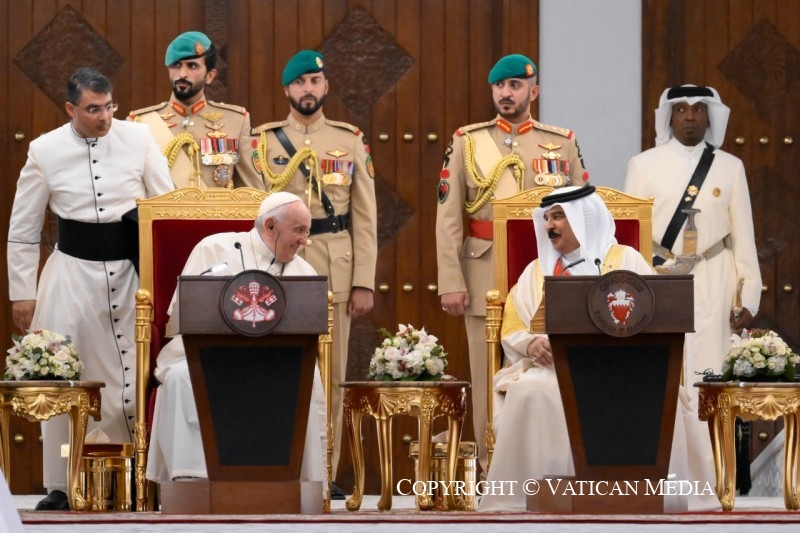Cardinal Ayuso: dialogue as an “existential skill“
By Jean Charles Putzolu, Vatican News
Cardinal Miguel Ángel Ayuso Guixot, Prefect of the Dicastery for Interreligious Dialogue, looks back to Pope Francis‘ Apostolic Visit to Bahrain.
Dialogue, respect, fraternity and peace are, for Cardinal Miguel Ángel Ayuso Guixot, the four key words that echoed throughout Pope Francis’ just-ended Apostolic Visit to Bahrain. The four-day visit was the Pope’s 39th journey abroad since the beginning of his pontificate, and the second to the Gulf region. Looking back to the past few days, the Prefect of the Dicastery for Interreligious Dialogue is happy to note the continuity in Muslim-Christian relations, and the importance of dialogue that he describes as an “existential skill”.
Your Eminence, you accompanied Pope Francis on his 39th apostolic journey to Bahrain. How do you view this event?
So, as with any Apostolic journey of the Holy Father, when it comes to an end we take stock of the effects that are always very positive. In this case, regarding his Apostolic Visit to the Kingdom of Bahrain, my considerations are very positive because I found that it was a moment of encounter in a world in conflict. I found the meetings with the authorities and the Christian community very interesting and good, especially the gathering in the stadium for the celebration of the Eucharist with the Christian community. There were Christians from Bahrain and the entire Gulf region.
The ecumenical meeting was also very important, as was the interfaith meeting. I think it was a journey of open, simple dialogue, of familiarity, of brotherhood, as Pope Francis likes to do.
What prospects can we envisage for dialogue with Islam?
I don’t think there is anything new, but the dialogue continues and these meetings that we had in Bahrain are elements of continuity in the process of dialogue between Christians and Muslims. For me, dialogue is an existential attitude that we live every day. I found the meeting with the Muslim Council of Elders very interesting because I saw the desire on the part of this very renowned, very important institution; a desire, like ours, to continue to promote Islamic-Christian dialogue, the desire to collaborate with each other in common projects for the benefit of the international community, the desire to create a platform of unity in diversity, the desire for intra-Muslim dialogue, the desire for ecumenical dialogue, the desire for dialogue between the different components of our communities and particularly within the Muslim world.
Let us remember the message of the Grand Imam of Al-Azhar who once again showed his availability and made a very open appeal so that, within the Muslim world, there may be a rapprochement between Shiites and Sunnis. This is something really important. So, in terms of perspective, from everything I have seen, in many of the communiqués, there is nothing new, but there is continuity and that is the most important thing.
Patriarch Bartholomew was also present. This trip also had an ecumenical component…
Yes, in fact, the presence of Patriarch Bartholomew was really very important. It was a renewed sign of friendship and communion with the Pope. It was a testimony of the desire to build together a world of friendship and fraternity. We need, as I said earlier, an intra-Muslim dialogue between Shiites and Sunnis and other components of the Muslim world; and in the Christian world, we need an ecumenical dialogue between the different Christian communities. So I believe that Patriarch Bartholomew is the one who indicates the direction in which we must walk. The union of Pope Francis with Patriarch Bartholomew helps to promote this ecumenical dialogue.
Francis has insisted a lot on the importance of dialogue… Is there any other alternative to build a peaceful coexistence?
I think the Pope said that the keys to the apostolic journey to the Kingdom of Bahrain can be summarised in four words: dialogue. He spoke of dialogue, dialogue, dialogue. So it is dialogue, mutual respect, brotherhood and peace. If we really want to walk the paths of peace, we need to continue to promote dialogue; we need to promote mutual respect and we need to promote the fraternity that was widely expressed in the Document on Human Fraternity that inspired the Holy Father to write the encyclical Fratelli tutti.
